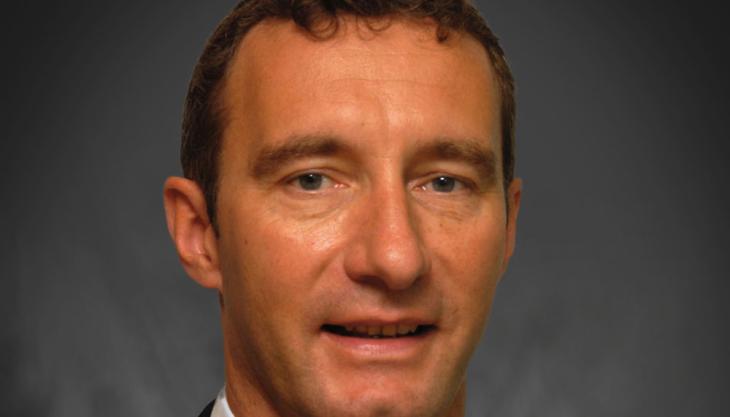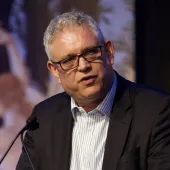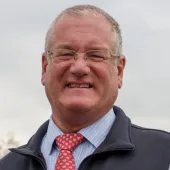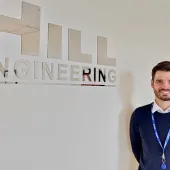Q&A – Latest developments at Doosan Bobcat

Martin Knötgen, president of Doosan Bobcat Inc in Europe, Middle East and Africa (EMEA) answers questions on recent developments in the EMEA region
Q1. Please explain the background to some of the decisions you have made in the last three years, beginning with the closure of the Doosan Heavy manufacturing plant at Frameries in Belgium?
I joined Doosan Bobcat EMEA from the automotive industry in 2010 as vice-president operations EMEA, just as the construction equipment industry started to recover from the crisis in 2008/09. I became EMEA president for Doosan Bobcat in 2012.
When I arrived at the company I helped to implement changes to update our factories, especially our plant in Frameries where part of our excavator range for Europe was produced. By introducing the latest technology and manufacturing methods, we successfully increased productivity as we prepared for what we believed would be a fast recovery in the construction equipment market in EMEA.
Unfortunately, the perceived industry growth did not materialize as expected and today, six years later, the sales volumes in EMEA are still only 65% of what they were at the end of 2007 in the heavy construction machinery sector and 75% for the compact equipment market.
So, despite the success we had in lowering costs and raising output at Frameries, the lower market demand for excavators in Europe meant that it was no longer cost-efficient to carry on production at this site and Frameries was closed in 2015.
Today we import these excavators from our plants in Korea and customize them in the Netherlands, providing even better quality and an improving service for the European market while permanently expanding the product and support offering, clearly demonstrating Doosan Bobcat’s commitment to Europe and its highly demanding and advanced markets.
Q2. Last year Doosan sold their Montabert SAS subsidiary to Joy Global Inc. Please explain the background to that divestiture?
Doosan Bobcat Inc are committed globally to securing growth and maintaining the company’s position in the top tier of construction machinery manufacturers worldwide. As part of the strategy the company has adopted to achieved these goals, Doosan Bobcat EMEA continue to focus on their core businesses in heavy and compact equipment, maximizing synergies between different parts of our operations wherever possible to capture all growth opportunities in order to significantly grow the company’s business in EMEA.
The hydraulic breaker and drilling equipment ranges at Montabert did not offer good synergies with our core operations, so we decided to sell the business to Joy Global where Montabert are an excellent fit with Joy’s core business of designing, manufacturing, distributing and servicing high-productivity equipment for the global mining industry. This evolution provides Montabert and their employees with the opportunity to work for a global mining equipment business that is active in all major mining regions in the world.
Q3. Doosan Bobcat have a strong and growing commitment to the EMEA market – could you explain your approach to this market?
To meet our aspirations, Doosan Bobcat have invested in new developments, infrastructure, manufacturing facilities and the growth of our people in EMEA.
The investment in the Bobcat telehandler plant at Pontchâteau in France has allowed us to significantly enlarge our telehandler product offering and improve product quality and efficiency. Pontchâteau serves Doosan Bobcat’s global telehandler markets as the core source of Bobcat telehandlers for construction and agricultural applications.
But the changes have been even more profound at the Doosan Bobcat campus at Dobris, in the Czech Republic, where integrating every part of our operations and product development on one site – from engineering and design, sourcing, manufacturing, marketing, aftermarket, distribution and demonstrations to training for our EMEA dealers and customers – continues to bring enormous benefits in every part of our business.
Over the last decade the compact equipment business in EMEA has been transformed from an importer model to a fully integrated manufacturer exporting more locally produced machines than we are importing from North America or Korea. Because of these developments, 80% of the compact product sold in the EMEA region is now made at Dobris. In addition, because of the competitiveness of the Dobris plant, which offers lower manufacturing costs, 30% of the output from the Dobris plant is exported for sale in North America and Asia.
Last year I had the pleasure of officially inaugurating the new Innovation Centre at the Dobris campus, which is a further demonstration of the long-term commitment of Doosan Bobcat to EMEA and the result of the bold decisions taken by the company when Europe and the rest of the world were experiencing a pronounced economic downturn, investing in people and innovative industrial and business solutions around the world.
We are developing the Dobris Innovation Centre as a European Engineering Centre of Excellence, which will serve as an expert R&D centre for all Doosan engineering teams across EMEA and has taken responsibility for small loaders and compact excavators from 1–3 tonnes. Our Innovation centre in Dobris is connected to two more centres in Bismarck (US) and Inchon (Korea). While each centre is focused on developing solutions for their local markets, the three share a technology roadmap that allows us to co-ordinate our most advanced projects when it comes to research and innovation. We believe innovation is what will get us to number one in compact equipment worldwide.
Further demonstrating our strong commitment for European customers, we have also moved the European Parts Centre for the Doosan Heavy range of excavators, wheel loaders and articulated dumptrucks in the last two years to Leipzig in Germany. Providing 24h delivery of parts to Doosan dealers and customers door to door anywhere in Europe from a stock of more than 43,000 parts, the 6,000 square metre Doosan European Parts Centre is housed in a large warehouse facility operated by Doosan’s partner, DHL Supply Chain.
Established at the end of 2014, the Doosan European Parts Centre is the result of significant investment by Doosan Bobcat to provide a value-added parts service for our European customers and dealers. Based on the success of this model, Doosan Bobcat are looking to move the company’s Bobcat and Doosan Portable Power parts businesses to Leipzig to benefit from the same parts customization and distribution methods to further optimize parts service for customers in EMEA.
Q4. In May 2016, Doosan Bobcat EMEA announced their intention to close their headquarters in Waterloo, Belgium. Please explain the reasons for this?
This important strategic decision is a logical consequence of the footprint changes described above. The consolidation of the Doosan Bobcat EMEA headquarter functions from the facility at Waterloo and the relocation of them to the main operational site in Dobris with its R&D, training and demonstration, production and logistical activities will provide the company with much higher effectiveness and generate even more synergies. And, most importantly, it will support one of our key priorities: customer focus and proximity.
As I mentioned earlier, Doosan Bobcat have high aspirations and a strong commitment to the Europe, Middle East and Africa market, and with our drive, determination, focus and increased resource allocation, we are aiming to support our EMEA customer base even better in the future.
Q5. As well as Europe, you are also responsible for Bobcat and Doosan Portable Power in the Middle East, Africa and Russia. Could you elaborate on the challenges in these markets and your plans going forward?
The new Innovation Centre, the compact equipment plant and all the other elements of the Doosan Bobcat campus in Dobris are a shared resource not only for Europe, but also the key markets of the Middle East and Africa (MEA) and Russia.
As well as the developments at Dobris, we have also instituted changes in our local operations in these markets. In 2015, for example, we opened a new Parts Distribution Centre (PDC) for Bobcat and Doosan Portable Power products in Dubai, in the United Arab Emirates. The new PDC is a collaboration with Agility, one of the leading global logistics providers, who are hosting and managing the new facility at the Jebel Ali Free Zone in Dubai.
Designed to better serve our dealers and customers in MEA with better availability, shorter delivery times and lower logistical costs, the new Dubai PDC has made it possible for us to deliver parts to more than 90% of the region within 24h. As well as enhancing our aftermarket service, the new PDC demonstrates our strong commitment to the MEA market.
We are always listening to our dealers and customers in every area, and in response to local demand from MEA markets, we introduced a new product line earlier this year with the launch of the new Bobcat backhoe loader range in the Middle East. This has been a very successful launch which we are planning to expand to other markets in the near future.
Whilst Middle East markets are suffering from the low oil price, the region is a very big market for us and we will continue supporting our excellently performing partners there, where we enjoy an exceptional position, such as market shares of 50% and more for Bobcat loaders.
Russia has also been quite a difficult market recently, but there are signs of recovery and as we are prepared to support our partners in both difficult and good times, we will enjoy success together once market conditions improve.
Q6. In conclusion, do you have some general comments on the EMEA market and your plans going forward?
Doosan Bobcat stands for long-lasting partnerships, and for individual solutions for all different markets whatever their challenges and demands.
Like most businesses, we did see a slight suspension in activity in the UK before the referendum, but since the vote we have seen a normalization in business levels. The UK is an important market for Doosan Bobcat and, in our planning, we have not changed our business strategy in light of the Brexit result.
With the excellent dealer network channel we have in the UK, I see no big adjustments needed in the way we operate there and it will have little impact on our sales in the rest of Europe.
In the very competitive European market, no one country in Europe really stands out in terms of sales volumes. Our strongest markets are in Germany, France, the UK and Scandinavia, but we are expecting good things from Italy in the near future. Like Spain, which is also beginning to wake up after the recession, the market in Italy has evened out since the recession. We also predict growth in Eastern Europe, where infrastructure projects are continuing to be funded by EU money.
We have made huge strides in the last five years with the Doosan Heavy range in terms of market share and brand loyalty in Europe, and we believe that there is no big differentiation on the product side, with Doosan Bobcat now part of the top tier of manufacturers. Bobcat continue to defend their leadership position in EMEA in performance, quality and durability.
The company has a long-term commitment to the construction equipment market in EMEA, simplifying procedures and processes throughout to make sure it is even easier to do business with Doosan Bobcat. Our continued focus on core businesses will enable us to be successful in difficult market environments and by concentrating resources on our key priorities, this will allow Doosan Bobcat to grow even faster in the EMEA market.







